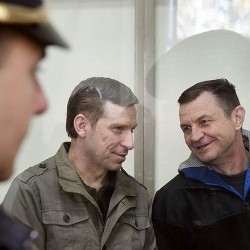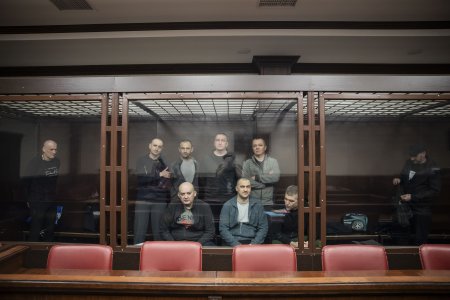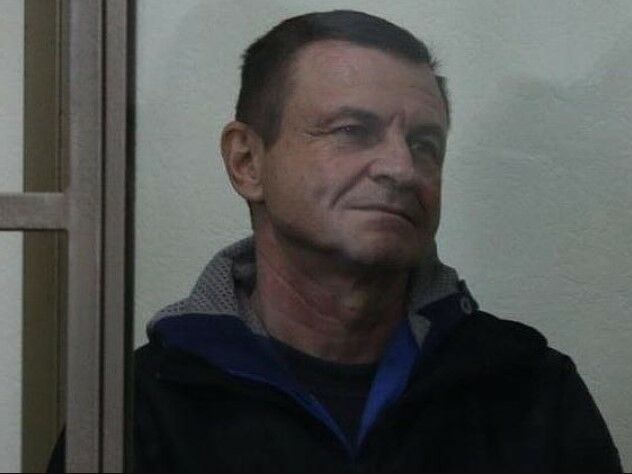
Volodymyr Dudka will be turning 59 on 30 September after spending almost seven years in Russian captivity. The former Ukrainian naval captain was targeted together with two Ukrainian academics – Oleksiy Bessarabov and Dmytro Shtyblikov - because Russia’s FSB needed Ukrainians for their latest claim to have ‘thwarted a Ukrainian saboteur plot’ in occupied Crimea. The renowned (and later forcibly dissolved) Memorial Human Rights Centre condemned the persecution, and said that such supposed ‘Ukrainian saboteur’ prosecutions were needed for propaganda purposes as part of a long campaign to present Ukraine and its citizens as the enemy, as a ‘danger’ from which Russia was purportedly protecting Crimeans.
Dudka is the oldest of the three recognized political prisoners, and had chronic medical conditions even before his arrest, torture and the ongoing torment of Russian imprisonment. His health is now of major concern, and he is one of at least 21 Crimean Tatar and other Ukrainian political prisoners whose lives Russia is directly endangering.
‘Ukrainian saboteur’ plots
Among the false claims that Moscow made to justify its invasion and annexation of Crimea was the pretence that it needed to ‘protect’ the Russian population. For its first ‘Ukrainian saboteur plot’, the FSB seized renowned Ukrainian filmmaker Oleh Sentsov and three other Ukrainian opponents of Russian occupation and tortured two of the men into providing televised ‘confessions’.
Russia made two attempts in 2016 to fabricate ‘Ukrainian saboteur plots’, with the first, in August 2016, eliciting open disbelief from the international community. The FSB tried again, in November 2016, but this time at least made a point of ensuring that the claimed ‘conspirators’ knew each other. On 9 November 2016, it arrested three friends living in Sevastopol. Volodymyr Dudka (b. 1964) was a former naval captain, who had served for 27 years before taking early retirement for health reasons. He had recently become a grandfather, and spent a great deal of time with his small granddaughter, but was also receiving medical treatment, and had been on his way to hospital for treatment of an inflamed stomach ulcer when he was seized by the FSB. The latter also came for his two friends, both former naval men, and world-known academics. Dmytro Shtyblikov (b. 1970) and Oleksiy Bessarabov (b. 1976) both worked as military analysts for the Nomos Centre, a Ukrainian non-governmental think tank on research into geopolitical issues and Euro-Atlantic Cooperation concerning the Black Sea region.
On 10 November 2016, the FSB claimed that it had detained “members of a terrorist – sabotage group from the Ukrainian Defence Ministry’s Military Intelligence who were planning to carry out acts of sabotage on sites of military and vital civilian infrastructure in Crimea”. It asserted that powerful explosive devices, weapons and ammunition had been found, together with special communications devices, maps of the supposed sabotage targets and “other material evidence of their criminal activities”.
Those claims were never retracted but were scarcely reflected in the actual indictment. The same was true of two other arrests later in November 2016. These only became known because of videos broadcast on Russian state-controlled propaganda channels purporting to show the arrests and ‘confessions’ of two younger Ukrainians from Sevastopol, also with a naval background. In fact, both Oleksiy Stohniy and Hlib Shabliy were later ‘tried’ and convicted of charges that had little, or nothing, to do with their ‘confessions’.
Torture
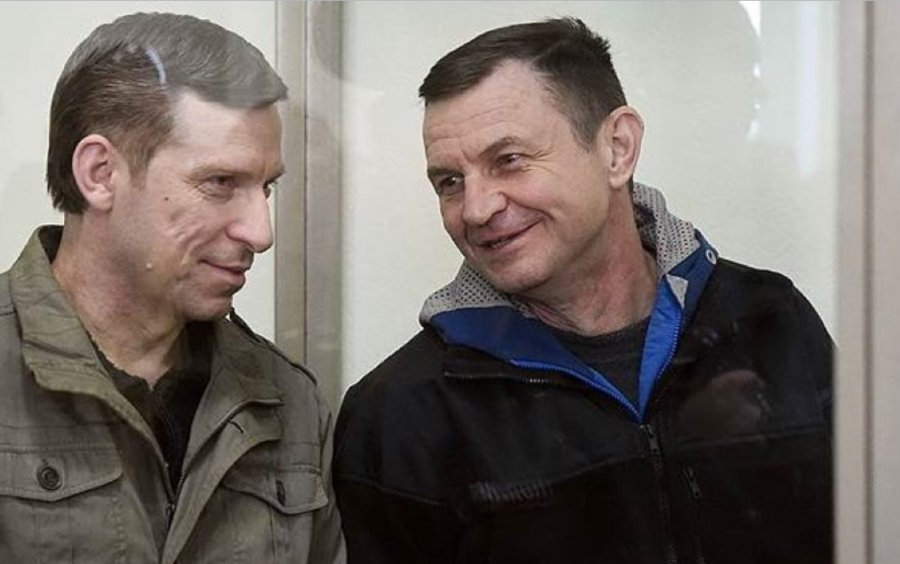
Dudka and Bessarabov were finally able to see independent lawyers and to retract the ‘confessions’ which they said that they had made under torture and because of threats against their family.
Shtyblikov, whom the FSB had designated as ‘ringleader’, was never allowed to see an independent lawyer. He later made it clear to his family that he too had been subjected to torture and threats against family members. This was almost certainly why he agreed to admit to the charges and provide false testimony. On 16 November 2017 he received a five-year sentence.
The apparently lower sentence for agreement to go along with the prosecution was, it transpired, a cruel and treacherous trick. Shortly before the five years were up, the FSB concocted new, evidently absurd, charges of ‘treason’, with Shtyblikov sentenced on 27 April 2022 to 19.5 years (counted from 9 November 2016) (details here)
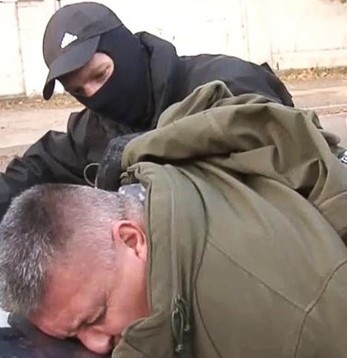
During their ‘trial’, both Dudka and Bessarabov denied the charges and clearly stated that they had been subjected to torture, including through electric shocks. Russia’s Investigative Committee ignored this and refused to lodge an investigation.
Falsified ‘evidence’
Despite the FSB claims, the only video footage released was of supposed ‘confessions’ to working for Ukraine’s Military Intelligence from Shtyblikov and Bessarabov and one showing the seizure of Shtyblikov, and then the ‘search’ of his home. Although the FSB claimed to have found weapons and explosives, the video showed only the Ukrainian flag hanging on the wall, a fake business card which had become notorious for its use in Russian propaganda back in 2014, and an airgun which Shtyblikov used in the game Airsoft (Strike Ball).
In both Dudka’s and Bessarabov’s cases, illegal methods were used to obtain saliva and other DNA material, without any protocol being drawn up and without a lawyer present. Dudka’s lawyer Sergei Legostov has given numerous examples of the absurd ‘evidence’ which he said you wouldn’t find “in the shoddiest detective novel”.
Sentences
All of the above was ignored by ‘judges’ Igor Vladimirovich Kozhevnikov; Vasily Aleksandrovich Avkhimov; and Vladimir Ilych Reshetnyak of the Southern District Military Court in Rostov. Both Dudka and Bessarabov were sentenced on 4 April 2019 to 14 years’ harsh-regime imprisonment and steep fines. The sentences were upheld by Russia’s Supreme Court on 15 October 2019.
Please write to Volodymyr Dudka and Oleksiy Bessarabov!
Even just a few words will tell them and Russia that they are not forgotten. Letters need to be in Russian, and any political subjects or reference either to the case, or to Russia’s war against Ukraine, should be avoided. If possible, include an envelope and some thin paper so that they can respond.
If Russian is a problem, the following would be fine, maybe with a photo or card (the address on the envelope can be in Russian or English)
Дорогой Владимир!
Поздравляем вас с днем рождения! Здоровья Вам, сил и бодрости духа! Простите, что мало пишу – мне трудно писать по-русски, но мы все о Вас помним.
[Dear Volodymyr,
Happy Birthday! I wish you good health, strength and good spirits! I’m sorry that this letter is short – it’s hard for me to write in Russian., but you are not forgotten.]
Or simply
Привет!
Желаю Вам здоровья, мужества и терпения, надеюсь на скорое освобождение. Простите, что мало пишу – мне трудно писать по-русски, но мы все о Вас помним.
[Hi. I wish you good health, courage and patience and hope that you will soon be released. I’m sorry that this letter is short – it’s hard for me to write in Russian., but you are not forgotten.]
Addresses
Volodymyr Dudka
355044 Российская Федерация, г. Ставрополь-44, ФКУ ИК-11 УФСИН России по Ставропольскому краю,
Дудка, Владимир Михайлович, 1964 г.р,
[Or in English:
Russia 355044, Stavropol-44, Prison No. 11
Dudka, Vladimir Mikhailovich, b. 1964]
Oleksiy Bessarabov
357000, Российская Федерация, с. Кочубеевское, ФКУ ИК-1 УФСИН России по Ставропольскому краю,
Бессарабов, Алексей Евгеньевич, 1976 г.р
[or in English
Russia 357000, Stavropol Krai, Kochubeyevskoe, Prison No. 1
Bessarabov, Aleksei Yevgenievich, b. 1976 ]
Details for writing to Dmytro Shtyblikov will be reported on this site when they become available.
